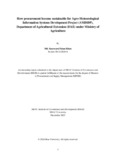| dc.contributor.advisor | Hoque, Mosta Gausul | |
| dc.contributor.author | Khan, Md. Sanowarul Islam | |
| dc.date.accessioned | 2024-05-07T08:54:10Z | |
| dc.date.available | 2024-05-07T08:54:10Z | |
| dc.date.copyright | ©2023 | |
| dc.date.issued | 2023-12 | |
| dc.identifier.other | ID 21282016 | |
| dc.identifier.uri | http://hdl.handle.net/10361/22759 | |
| dc.description | This internship report is submitted in partial fulfillment of the requirements for the degree of Masters in Procurement and Supply Management, 2023. | en_US |
| dc.description | Cataloged from PDF version of internship report. | |
| dc.description | Includes bibliographical references (pages 29). | |
| dc.description.abstract | This thesis focuses on the development of sustainable procurement strategies for the Agro-Meteorological Information Systems Development Project (AMISDP) in the Department of Agricultural Extension (DAE) under the Ministry of Agriculture. The objective of this study is to establish a framework that enhances the sustainability of procurement practices and aligns them with the overall goals of the project and the department.
Sustainable procurement (SP) is defined as procurement that adheres to the ideals of sustainable development, such as supporting a strong, healthy, and just society, living within environmental constraints, and fostering good governance. Sustainable procurement is a purchasing strategy that considers economic, environmental, and social sustainability. Public procurement including AMISDP is concerned with how government organizations spend money from taxpayers on goods, works, and services. Transparency, accountability, and delivering value for money for residents and taxpayers guide public procurement.
The current state of sustainable procurement practice in the public sector has been investigated through interviews with important procurement specialists from a variety of public sector organizations, focusing on three dimensions of sustainable procurement: economic, environmental, and social. The investigations show that, while there are a few situations where some sustainability challenges are being addressed, they are not very widespread in the public sector as a whole.
In Bangladesh, the existing tendering procedure is still based on the lowest price approach, and the full life costing strategy is rarely addressed in various public sector department. With the exception of a handful, the majority of public sector organizations do not have such an environmental management system in place. According to the study, there is now almost no mechanism in our public procurement system to check the environmental performance of contractors/suppliers.
Public procurement and AMISDP guarantees that everyone has an equal opportunity as well as World Bank has the same rule. The Public Procurement Rules, 2008 forbid establishing specifications that can exclude any suppliers/contractors. Ethical labor practices are present throughout the procurement system, albeit to a lesser extent. Female labor participation is not effectively ensured by contract provisions, despite the fact that contractors occasionally use female labor force for their own benefit.
Sustainability factors should be incorporated into the tendering process. Individual procurement professional knowledge and awareness appear to be crucial in order to make active sustainable buying choices. A strong commitment is required from the top of government all the way down to the ministries, authorities, and chief executives in all public agencies. A sustainable procurement policy must be developed, and the public procurement structure must be aligned with the policy. At the outset of such a policy, political will is essential.
The AMISDP project's sustainable procurement strategy presents policy recommendations for the DAE and AMISDP, practical guidelines for procurement officers, and addresses potential impediments and mitigation measures for future research directions in the field of sustainable procurement.
Contributes to the knowledge and practice of sustainable procurement in the context of the AMISDP project. By incorporating sustainable procurement strategies, the DAE and AMISDP can improve the sustainability of their procurement practices, reduce environmental impacts, promote social responsibility, and achieve long-term economic viability in project implementation. | en_US |
| dc.description.statementofresponsibility | Md. Sanowarul Islam Khan | |
| dc.format.extent | 39 pages | |
| dc.language.iso | en | en_US |
| dc.publisher | Brac University | en_US |
| dc.rights | Brac University internship reports are protected by copyright. They may be viewed from this source for any purpose, but reproduction or distribution in any format is prohibited without written permission. | |
| dc.subject | Agro-meteorological information | en_US |
| dc.subject | Department of Agricultural Extension | en_US |
| dc.subject | Ministry of Agriculture | en_US |
| dc.subject.lcsh | Procurement | |
| dc.subject.lcsh | Sustainable Development. | |
| dc.subject.lcsh | Meteorology, Agricultural. | |
| dc.title | How procurement become sustainable for Agro-Meteorological Information Systems Development Project (AMISDP), Department of Agricultural Extension (DAE) under Ministry of Agriculture | en_US |
| dc.type | Internship report | en_US |
| dc.contributor.department | Brac Institute of Governance and Development, Brac University | |
| dc.description.degree | M. Procurement and supply management | |

